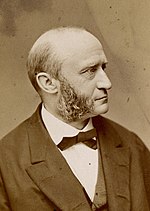Ernst Wilhelm von Brücke
| Ernst Wilhelm von Brücke | |
|---|---|

Ernst von Brücke.
|
|
| Born | 6 July 1819 Berlin |
| Died |
7 January 1892 (aged 72) Vienna |
| Nationality | Germany |
| Fields | Physiology |
| Known for | Psychodynamics |
| Influenced | Sigmund Freud |
Ernst Wilhelm Ritter von Brücke (6 July 1819 – 7 January 1892) was a German physician and physiologist. He is credited with contributions made in many facets of physiology.
He was born Ernst Wilhelm Brücke in Berlin. He graduated in medicine at the University of Berlin in 1842, and during the following year, he became a research assistant to Johannes Peter Müller. In 1845 he founded the Physikalische Gesellschaft (Physical Society) in Berlin, together with Emil Du Bois-Reymond, Hermann von Helmholtz and others, in the house of physicist Heinrich Gustav Magnus. Later on, this became known as the Deutsche Physikalische Gesellschaft (German Society of Physics). In 1846, Brücke was elected teacher of anatomy in the Akademie der Bildenden Künste, in Berlin. Following that, in 1848 he was appointed as professor of physiology at the University of Königsberg, replacing Karl Friedrich Burdach (1776–1847). In 1849 he acquired similar duties at the University of Vienna. In 1873, Emperor Franz Joseph I honored Brücke with a noble title— von Brücke— but he rarely used it.
Ernst Fleischl von Marxow (1846–1891), and Joseph Paneth (1857–1890), two colleagues of Freud, were assistants to Brücke in Vienna, however Brücke is most noted for his influence on Sigmund Freud, one of his other medical students. Freud began studying under Brücke in 1877, and continued doing so until 1883. He was tasked to examine the biology of nervous tissue, specifically comparing the brains of humans and other vertebrates to that of invertebrates. Freud would many times call Brücke the professor who shaped him the most. This influence led to the development of the science of psychodynamics. Brücke's teachings did not only influence Freud's work; parts of the noted psychologist's theory were pulled directly from his professor's principles, specifically the idea that all living things are dynamic and must bow to the laws of chemistry and physics.
...
Wikipedia
